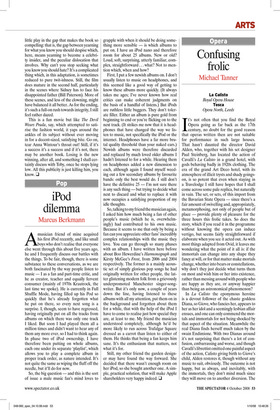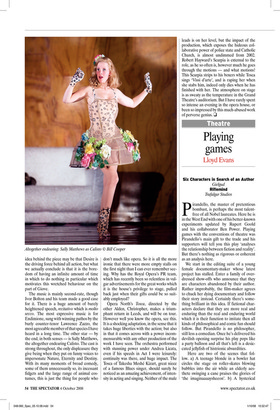Confusing frolic
Michael Tanner
La Calisto Royal Opera House Tosca Opera North, Leeds
It’s not often that you find the Royal Opera going as far back as the 17th century, no doubt for the good reason that operas written then are not suitable for performance in such large houses. That hasn’t daunted the director David Alden, who, together with his set designer Paul Steinberg, has located the action of Cavalli’s La Calisto in a grand hotel, with gods behaving badly in 1920s clothing. The era of the grand Art Deco hotel, with its atmosphere of illicit trysts and shady goingson, is so potent that even when staying in a Travelodge I still have hopes that I shall come across some pale replica, but naturally in vain. The set, or sets, of this import from the Bavarian State Opera — since there’s a fair amount of swivelling and, appropriately, metamorphosing, not only of people but of place — provide plenty of pleasure for the three hours this frolic takes. So does the story, which if you read it in the programme without knowing the opera can induce vertigo, but seems fairly straightforward if elaborate when you see it acted out. As with most things adapted from Ovid, it leaves me wondering what the point of it all is: if the immortals can change into any shape they fancy at will, or for that matter make mortals change, whether into bears or constellations, why don’t they just decide what turns them on most and wish him or her into existence, rather than messing around with people who are happy as they are, or anyway happier than being an astronomical phenomenon?
In La Calisto the eponymous heroine is a devout follower of the chaste goddess Diana, so Giove, who fancies her, appears to her as her idol and a seemingly lesbian affair ensues, and one can only commend the mortals and immortals for not being shocked by that aspect of the situation. Meanwhile the real Diana finds herself much taken by the swain Endimione. With two Dianas around it’s not surprising that there’s a lot of confusion, embarrassing and worse, and though Cavalli’s librettist omitted one painful aspect of the action, Calisto giving birth to Giove’s child, Alden restores it, though without any music to suit, obviously. The outcome is not happy, but as always, and inevitably, with the immortals, they don’t mind much since they will move on to another diversion. The idea behind the piece may be that Desire is the driving force behind all action, but what we actually conclude is that it is the boredom of having an infinite amount of time in which to do nothing in particular which motivates this wretched behaviour on the part of Giove.
The music is mainly second-rate, though Ivor Bolton and his team made a good case for it. There is a huge amount of barely heightened speech, recitativo which is molto secco. The most expressive music is for Endimione, sung with winning pathos by the burly counter-tenor Lawrence Zazzo, the most agreeable member of that species I have heard in a long time. The other star — by the end, in both senses — is Sally Matthews, the altogether endearing Calisto. The cast is strong throughout, the only displeasure they give being when they put on funny voices to impersonate Nature, Eternity and Destiny. With its many moments of broad comedy, some of them unnecessarily so, its incessant fidgets and the large range of animal costumes, this is just the thing for people who don’t much like opera. So it is all the more ironic that there were more empty stalls on the first night than I can ever remember seeing. Why has the Royal Opera’s PR team, which has recently been so relentless in vulgar advertisements for the great works which it is the house’s privilege to stage, pulled back just when their gifts could be so suitably employed?
Opera North’s Tosca, directed by the other Alden, Christopher, makes a triumphant return in Leeds, and will be on tour. However well you know the opera, see this. It is a shocking adaptation, in the sense that it takes huge liberties with the action; but also in that it comes across with a power incommensurable with any other production of the work I have seen. The orchestra performed with stunning power under Andrea Licata, even if his speeds in Act I were leisurely: continuity was there, and huge impact. The Tosca of Takesha Meshé Kizart, great niece of a famous Blues singer, should surely be noticed as an amazing achievement, of intensity in acting and singing. Neither of the male leads is on her level, but the impact of the production, which exposes the hideous collaborative power of police state and Catholic Church, is almost undimmed from 2002. Robert Hayward’s Scarpia is external to the role, as he so often is, however much he goes through the motions — and what motions! This Scarpia strips to his boxers while Tosca sings ‘Vissi d’arte’, and is raping her when she stabs him, indeed only dies when he has finished with her. The atmosphere on stage is as sweaty as the temperature in the Grand Theatre’s auditorium. But I have rarely spent so intense an evening in the opera house, or been so impressed by this much-abused work of perverse genius. ❑











































































 Previous page
Previous page